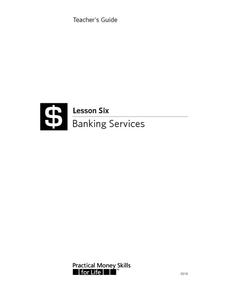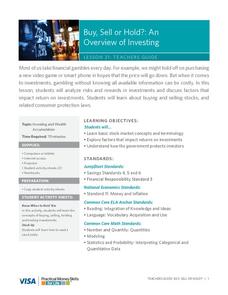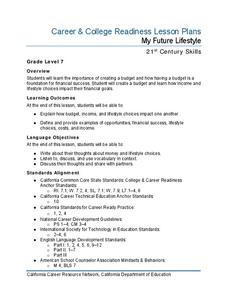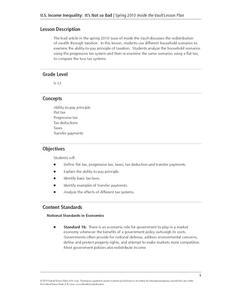Visa
Banking Services
From writing and depositing checks to comparing ATM and debit cards, pupils develop financially savvy practices and build foundational knowledge of the financial service products available through banking institutions.
Visa
Earning Money
Where does money come from? Is it limitless and always available? Introduce your youngsters to the concept of earning through jobs and/or chores with a matching activity and provided worksheets.
Visa
Buy, Sell or Hold?: An Overview of Investing
Break down the often-daunting topic of the stock market with this resource, in which pupils learn basic terminology regarding buying and selling stocks, as well as the factors that influence how much return individuals can receive on...
EngageNY
The Mathematics Behind a Structured Savings Plan
Make your money work for you. Future economists learn how to apply sigma notation and how to calculate the sum of a finite geometric series. The skill is essential in determining the future value of a structured savings plan with...
Federal Reserve Bank
Beatrice’s Goat: A Lesson on Savings Goals
Youngsters learn the meaning of saving and how to reach savings goals by first reading a story of a young Ugandan girl who is gifted a goat, and then discovering the opportunity costs of savings decisions made by her and her family.
Federal Reserve Bank
To Rent-to-Own or Not to Rent-to-Own?
Explore the key elements of a contract with your young adults, and delve into the features and unique benefits of a rent-to-own contract through discussion and worksheet practice.
Visa
Living On Your Own
Learners gain a realistic understanding of what is required for independent living. They begin by setting up a budget based on needs and lifestyle, and then use worksheets and a presentation to practice such skills as reading a rental...
Visa
Allowances and Spending Plans
Help youngsters understand how to manage small amounts of money by discussing an allowance and the difference between spending, saving, and giving.
California Department of Education
My Future Lifestyle
Mortgage, insurance, car payments...how much money will your learners need to support their desired lifestyle? Part three in a six-part college and career readiness lesson plan series tasks young job seekers with creating a monthly...
Texas Education Agency (TEA)
Creating a Lifestyle Budget
Using the practical resource, pupils view a PowerPoint and complete a KWL chart to learn all about budgeting. To finish, they create a budget based on their projected lifestyle profiles.
Nebraska Department of Education
Time Management
As eighth-graders move on to high school, strong time management skills become critical. As part of a career Planning & Management unit, scholars learn how to analyze their time and consider how their choices impact their ability to...
Council for Economic Education
Opportunity Cost
The price of those new shoes involves more than just money! Individuals explore the concept of opportunity cost using a video clip and gratification discussions. They prepare a budget based off of their set of values in regards to...
California Department of Education
College: Plan Well and Pay Less
They say you gotta pay to play, and postsecondary education is no exception! High schoolers learn how to research and analyze the cost of postsecondary education as well as the different ways to pay for schooling. Learners then work...
Federal Reserve Bank
U.S. Income Inequality: It's Not So Bad
What is the difference between a flat tax, progressive tax, tax deduction and transfer payments? Pupils examine the ability-to-pay principle of taxation through discussion, problem solving, and a variety of worksheets on topics from US...
Council for Economic Education
Loan Amortization - Mortgage
When you buy a home for $100,000, you pay $100,000—right? On the list of important things for individuals to understand, the lesson presents the concept of interest rates and loan amortization using spreadsheets and online sources....
Curated OER
Advanced Math Budget Project
What financial situations and decisions await young learners after they graduate from high school? This project allows class members to glimpse into the types of responsibilities they will have as adults, from considering job...
Visa
Cars and Loans
What's the best way to pay for a car? Should I buy used or new? Can I realistically afford a car? Pupils discover the ins and outs of buying a car, from how to shop for car insurance to the advantages and disadvantages of leasing.
Texas Education Agency (TEA)
Identity Theft and Credit Safety
Deter, detect, defect. Pupils watch a PowerPoint presentation and video about identity theft and credit card safety, taking notes to use later. Next, they develop a plan for maintaining credit safety and write an essay about the topic.
Texas Education Agency (TEA)
Legal Responsibilities of Financial Exchanges
Let's stock up on knowledge! With lecture and discussion, pupils explore the legal responsibilities of monetary exchange. Scholars then research laws about financial exchange in the stock market and create a poster to illustrate their...
CK-12 Foundation
Continuous Interest
Continue teaching your financial scholars about interest. A slider interactive has users investigate the growth of an account earning continuous interest. A set of challenge questions has them solve problems given a variety of situations.
Texas Education Agency (TEA)
Credit Scores and Your Financial Future
How important is a credit score, anyway? Scholars view a PowerPoint and take notes about credit scores. Next, they write essays explaining their plans for achieving a good credit score.
Texas Education Agency (TEA)
Financial Planning in Business
It's all about the Benjamins! Scholars conduct research about a franchise to determine how much money they need for a startup business and create a PowerPoint to share what they found. Also, they design an informative brochure to show...
California Department of Education
California CareerZone Make Money Choices Student Workbook
An activity challenges scholars to make smart money choices. While visiting the California CareerZone website, pupils choose between budgeting for one's lifestyle or salary and complete a two-page worksheet based on the information...
Nebraska Department of Education
How Do You Define “Friend?”
Shared values are often the keystone in friendships. Class pairs use their "Values" handout from a previous lesson and interview one another to identify values they share and don't share. Then, consider how their differences contribute...
Other popular searches
- Math Money Management
- Money Management for Teens
- Money Management for Kids
- Esl Money Management
- Classroom Money Management
- High School Money Management
- Finance and Money Management
- Money Management Ell
- Esl Grammar Money Management
- Personal Finance for Teens
- Business Finances
- Finances and Parenting

























